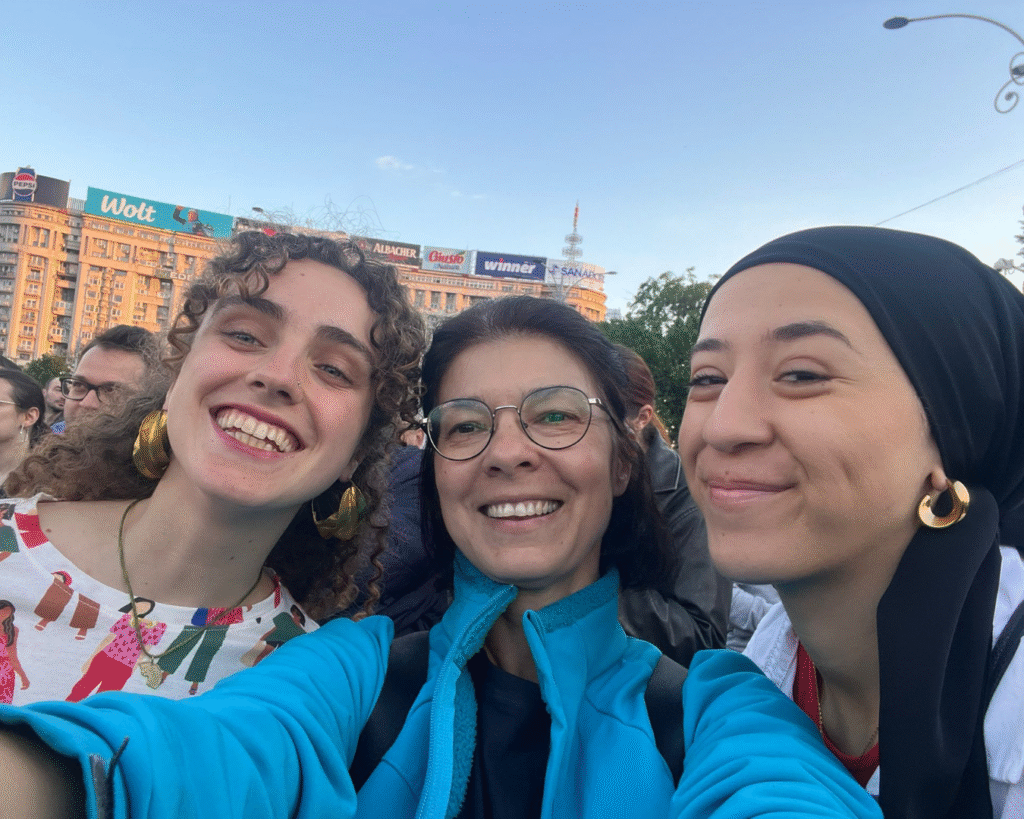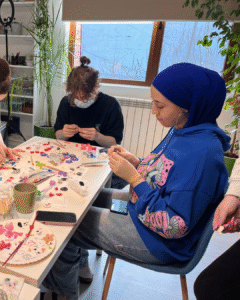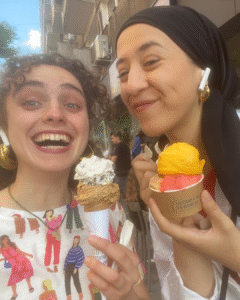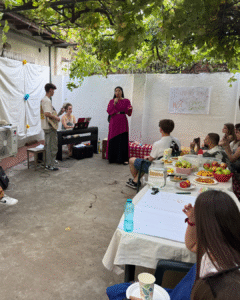
International Volunteering through ESC: the experience of young people who chose to get involved
International volunteering through the ESC gave Rim and Anna Chiara the opportunity to live a unique experience in Romania.
At the end of 2024, Rim and Anna Chiara decided to become international volunteers – and in doing so, they embarked on a six-month journey filled with both challenges and meaningful moments.
They discovered and came to understand Romanian culture, while also learning more about themselves: testing their limits, learning to adapt, and finding ways to collaborate. But the road wasn’t easy from the very beginning.
Rim and Nachi (as Anna Chiara is called by those close to her) arrived in Romania in January 2025. They hadn’t met before – all they knew about each other was where they came from, where they would be volunteering over the next six months, and that they’d be living together, sharing a kitchen and a living room.
„If I were to think of a movie title for my volunteering experience here in Romania, it would probably be more like a TV series,” Rim told us.
“I thought of Friends – it’s one of my favourite shows, and I don’t have a particular scene in mind. It’s more about the relationships. Just like in the seasons of Friends, you learn how to grow alongside each character, and that’s exactly how I feel about my colleagues, the teenagers at the Hub, Nachi, everyone. That’s how I would describe my ESC volunteering experience.”
Rim is 25 years old and comes from Paris, France. She had a strong desire to get to know Romania better – during an Erasmus semester in Denmark, she met a Romanian colleague who sparked her love for the language and Romanian traditions. At the same time, after finishing her university studies, Rim was looking for a period of self-discovery and personal challenge.
Anna Chiara, also 25, from Milan, Italy, was particularly drawn to the organisation and the activities she would be involved in.
“Although I studied environmental engineering, I realised that my true passion lies in working in the field of mental health and supporting young people’s personal development,” Anna Chiara said during her first week in Romania.
- Activities at the Hub as an International Volunteer
- The International Volunteers in Their Free Time, in Bucharest
- The Farewell Party of the International Volunteers
Both young women arrived in Romania through the European Solidarity Corps (ESC) – an initiative of the European Union that offers young people a structured way to contribute to the well-being of society while developing their personal and professional skills.
More than just a volunteering experience, ESC is a fully funded programme designed to bring together young people from different corners of the world, to help build a more inclusive society, support vulnerable communities, and address critical challenges.
In other words, young people aged between 18 and 30 can take part in volunteering mobilities lasting up to one year, during which key costs – such as travel, accommodation, meals, insurance, a personal allowance, and language courses – are fully covered by the European Solidarity Corps.
ESC operates on core principles of equal opportunities and non-discrimination, ensuring fair selection regardless of participants’ background. The activities carried out under the programme are designed to complement – not replace – the work of paid staff. Full support is provided throughout the entire volunteering experience, including training and mentorship.
The topics covered by ESC projects are wide-ranging – from environmental protection and cultural heritage preservation to social inclusion and humanitarian assistance.
Why go on an ESC mobility? And what about the feeling of loneliness?
Rim shared that her sense of belonging to the community developed gradually, especially as she began to understand the nuances of the local culture:
“I think the first moment I truly felt part of the community was when I started to understand certain cultural aspects of Romania,” she explained. “I mean things like the food, the traditions, and the language. Once you begin to understand them, it becomes easier – and people naturally draw closer to you.”
“I used to be a shy person,” Rim added. “I’d say I still am, but volunteering with teenagers really pushed me out of my comfort zone. If you don’t make the first move towards them, they might not make it either. I had to change my approach, and it was a process. It’s not easy, because every teenager is different, but I’m really proud of how much I’ve grown. It will mean a lot for my future.”
How can you become an ESC volunteer?

The process is simple:
-
Create an account on the European Youth Portal – complete your profile, add your interests and skills, and start exploring available opportunities.
-
Search for projects that inspire you and apply directly through the platform with a CV (ideally in Europass format) and a short motivation letter tailored to the project.
-
If you’ve made your decision, let’s talk. We can act as your sending organisation – we’ll support you with all the preparations and keep in touch with the host organisation throughout your experience.
-
Attend an interview (if required), then sign the volunteering agreement together with the involved organisations. This means all your responsibilities and rights are clearly stated, and you’ll know exactly what to expect.
-
Get ready to go! The sending organisation handles the logistics – tickets, accommodation, insurance, language support – so you can focus on the experience ahead.





